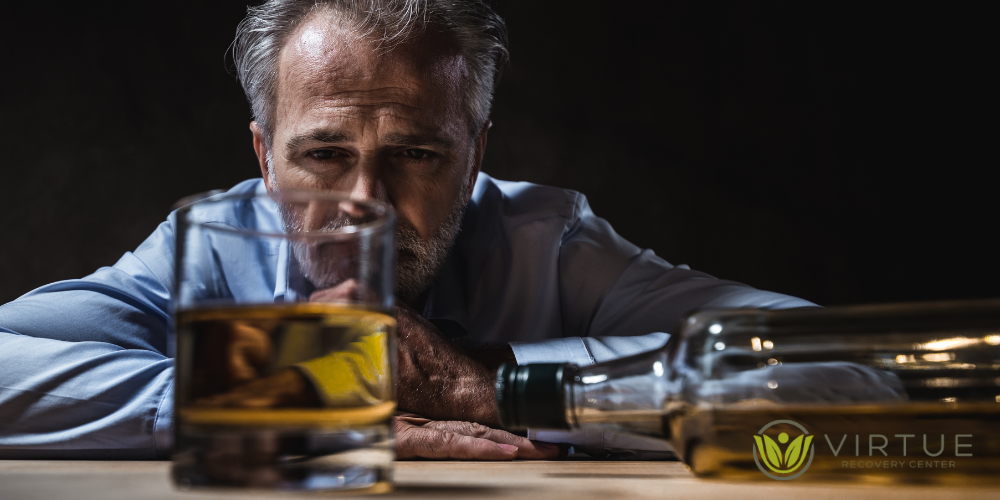Key Takeaways
- People who abuse both alcohol and benzodiazepines need special dual detox and rehab care because the withdrawal symptoms can be perilous.
- Taking alcohol and benzodiazepines together increases the risk of overdose, breathing problems, and cognitive problems.
- Residential treatment programs are the safest places to detox and receive therapy.
- To be successful in the long term, you need relapse prevention treatment that deals with mental health issues and trauma that are at the root of the problem.
- Being mentally prepared for drug and alcohol therapy increases your commitment and readiness to change.
Introduction
Contrary to popular belief, it is far more common and riskier to mix alcohol with benzodiazepines such as Xanax, Ativan, or Valium. Both of these drug types are central nervous system depressants, and when taken together, they can make you so sleepy that you could die.
For clients entering alcohol addiction rehab while also abusing benzos, treatment becomes more complex but also more critical. These cases need stringent detox protocols, supervision around the clock, and an approach that is very aware of trauma and helps with both physical and mental healing. Drug rehab centers across the country are now creating integrated programs that are specifically designed for this type of dual dependency.
Why Is It Dangerous to Mix Benzodiazepines with Alcohol?

Both alcohol and benzodiazepines work by making GABA, a neurotransmitter that calms brain activity. This may help with sleep or ease anxiety for a short time, but using both can dangerously slow down breathing and make it harder to make decisions. Long-term use of both drugs makes you very dependent on them and raises your risk of accidentally overdosing.
The National Institute on Drug Abuse (NIDA) says that mixing sedatives increases the risk of a fatal overdose because it makes breathing problems worse. The brain needs these drugs more and more to work, so when use is cut back or stopped, withdrawal symptoms can be extreme.
Why Do You Need Medical Supervision to Get Off Alcohol and Benzos?
It can be dangerous to stop drinking alcohol or taking benzodiazepines suddenly, but it can be deadly to prevent both at the same time. Possible side effects include seizures, hallucinations, extreme anxiety, and unstable heart rates.
Clients going through dual detox are safest in a structured residential treatment program. Medical teams may use tapering strategies for benzos while treating alcohol withdrawal with drugs like benzodiazepines (ironically, in controlled tapering doses), anticonvulsants, or beta-blockers.
SAMHSA recommends that medical detoxification be followed by assessment and stabilization services to prepare clients for further treatment (SAMHSA TIP 45).
How Do Mental Health Issues and Trauma Affect Alcohol and Benzo Addiction?
People who abuse alcohol and benzodiazepines often have trauma, anxiety, or depression that is not being treated. People usually get benzos for panic attacks or trouble sleeping, which are also things that alcohol can help with in the short term. This combination can become a detrimental way to handle things over time.
That’s why a good rehab program needs to include trauma therapy to find out what caused the person to use drugs in the first place. Clients can deal with bad memories without using drugs with therapies like trauma-focused CBT.
Acceptance and Commitment Therapy (ACT) is also utilized in many recovery centers to help individuals learn healthier ways to manage their emotions and act in alignment with their core values.
What Makes Relapse Prevention So Important for People With Two Addictions?

After detox, dual recovery doesn’t stop. Clients require ongoing care that encompasses education, learning how to manage problems, group therapy, and lifestyle modifications. A good plan for preventing relapse might include:
- Managing cravings and triggers
- Individual counseling once a week
- Psychoeducation and family therapy
- If appropriate, medication-assisted treatment
- Support that is still based on trauma
The Centers for Disease Control and Prevention (CDC) says that people with more than one addiction should get both medical care and behavioral therapy.
How Can You Get Ready Mentally for Drug and Alcohol Rehab?
Going to rehab can make you feel scared, guilty, or unsure of yourself. But being mentally ready makes you more likely to succeed. Getting prepared emotionally means:
- Recognizing how serious co-addiction is
- Creating a support network
- Being honest during therapy
- Letting go of shame and the need to be perfect.
Many drug rehab centers in Las Vegas and other places offer help before you go to a facility. These first steps help clients view rehab not as a punishment, but as a means to freedom.
Conclusion
People who are addicted to both alcohol and benzodiazepines are not alone, and there is still hope for them. Long-term recovery is possible with specialized care, trauma-focused therapy, and plans to keep from relapsing.
Are you or someone you care about having trouble with both alcohol and benzodiazepine addiction? Today, call Virtue Recovery Center, Killeen at 866-843-0545. Our trained clinical staff provides safe, caring care that helps people heal with strength and dignity, bringing their lives back to normal.
FAQs
1. Is it risky to stop drinking alcohol and taking benzodiazepines at the same time?
Yes. Medical professionals should always be there to watch people who are going through dual withdrawal in a residential setting.
2. What makes people mix alcohol and benzodiazepines?
To make the sedative effects stronger or to deal with anxiety, but this combination significantly raises the risk of overdose.
3. Can trauma therapy lower the risk of relapse?
Yes, for sure. Dealing with trauma can get rid of the reasons people use drugs and alcohol and help them succeed in the long run.
4. What makes relapse prevention different when two or more problems happen at the same time?
It needs to deal with both physical addiction and mental patterns through trauma-informed, integrated care.
5. What can I do to get my mind ready for rehab?
Accept help, let go of shame, and promise to be open during the healing process.
Can Alcohol Poisoning Affect Clients in Rehab for Benzodiazepine Abuse?
Alcohol poisoning can severely complicate recovery for clients in rehab for benzodiazepine abuse. The duration of alcohol poisoning effects may hinder their progress, making it challenging to manage withdrawal symptoms. Addressing these risks is essential to ensure a safe and effective healing environment for individuals seeking recovery.
Resource Links:
- Substance Abuse and Mental Health Services Administration. TIP 45: Detoxification and Substance Abuse Treatment. SAMHSA, 2020, https://store.samhsa.gov/product/TIP-45-Detoxification-and-Substance-Abuse-Treatment/SMA15-4131
- Benzodiazepines & Opioids Overdose Risk, National Institute on Drug Abuse. Benzodiazepines and Opioids. NIDA, Nov. 7, 2022, https://nida.nih.gov/research-topics/opioids/benzodiazepines-opioids
- Centers for Disease Control and Prevention. Alcohol Involvement in Opioid Pain Reliever and Benzodiazepine Drug Abuse–Related Emergency Department Visits and Drug-Related Deaths — United States, 2010. MMWR, Oct. 10, 2014, https://www.cdc.gov/mmwr/preview/mmwrhtml/mm6340a1.htm
- About the Author
- Latest Posts
Gigi Price holds licenses as a Master Social Worker and Clinical Drug Counselor. She completed her master’s degree in Social Work at Texas State University. Over the last decade, Gigi has been dedicated to utilizing evidence-based practices to enhance patient care and treatment planning, resulting in positive, long-term outcomes for patients and their families. Her passion lies in creating a treatment environment where professionals collaborate to bring about positive change and provide a safe, trustworthy therapeutic experience. Patients can be confident in receiving top-quality care under her leadership.
In her role as the Clinical Director of Virtue Recovery Houston, Gigi conducted research to identify the most effective approaches for treating patients with acute mental health diagnoses, PTSD, and Substance Use Disorder. She then assembled a team of skilled clinicians who could offer various therapeutic modalities, such as Cognitive Behavioral Therapy (CBT), Dialectical Behavioral Therapy
(DBT), Acceptance and Commitment Therapy (ACT), Somatic Exposure, Eye Movement Desensitization and Reprocessing (EMDR), and Cognitive Processing Therapy (CPT). Gigi takes pride in overseeing the development and implementation of Virtue Houston’s Treatment Program, which includes two specialized therapeutic curricula tailored to the unique needs of individuals struggling with mental health issues, addiction, and PTSD.












